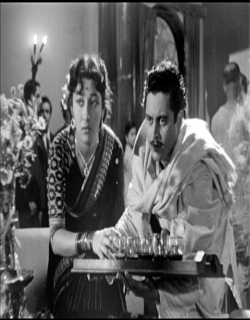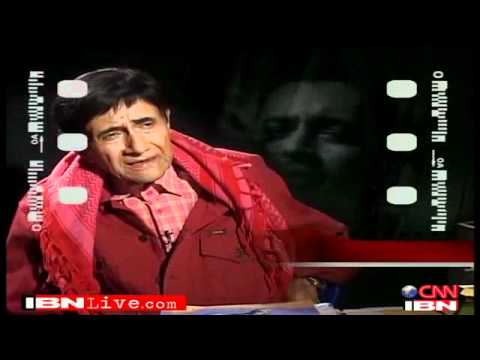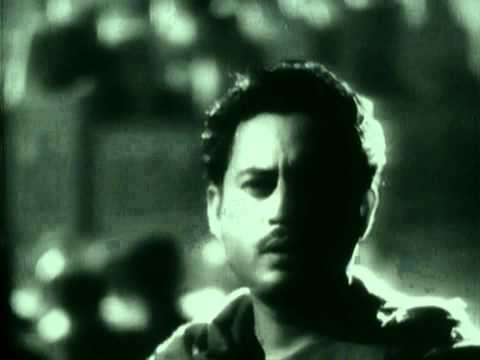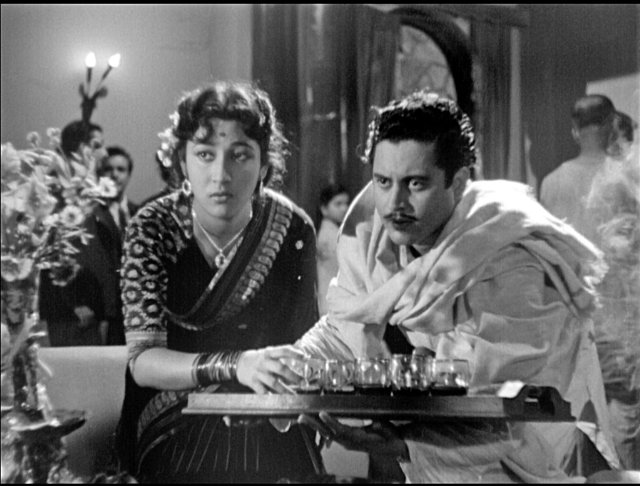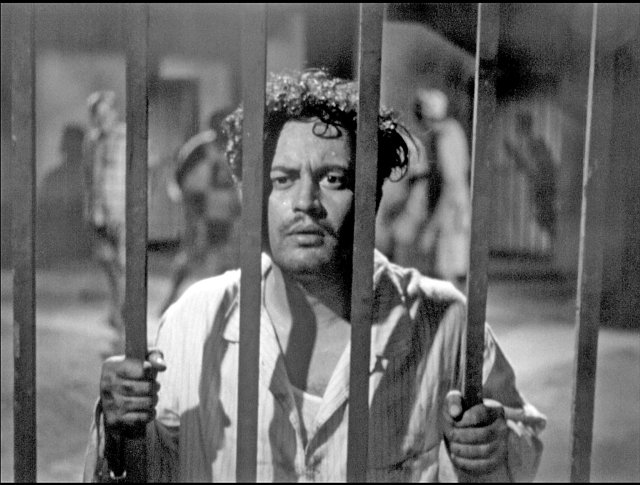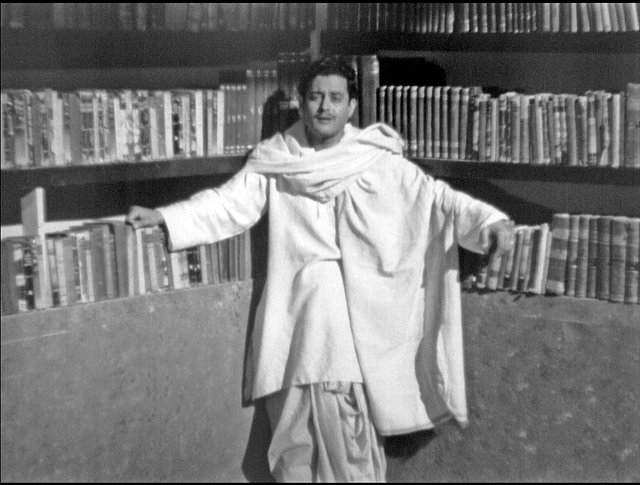Pyaasa 1957
Hindi 1957 (India)
Story
Vijay (Guru Dutt) is an unsuccessful poet. His works are not considered seriously by publishers or his brothers, who even sell his poems as waste paper to a ragseller. His day begins with knocking on the doors of publishing houses or newspapers circulating his poems or ‘nazams’, in a hope that some day the world would want to read what he has to say. Unable to bear their taunting at him being a good for nothing, he stays away from home often out on the streets, sleeping on a park bench with his notebook or when he is lucky, manages to get shelter at a friend’s place. Vijay has left his home because of the ill treatment of his 2 elder brothers who refuse to support an useless poet. But his mother’s heart lies with Vijay, an honest soul who cares for one and all. He meets Gulabo (Waheeda Rehman), a prostitute on the streets is enamoured of his poetry which she had got from the rag-seller and falls in love with him. She uses these lyrics and songs to lure her customers. Vijay also meets his ex-girlfriend Meena (Mala Sinha) from college, who is married to a big publisher Mr. Ghosh (Rehman) for financial security. Mr. Ghosh hires him as a servant to find out more about Meena. Vijay had given his coat to a beggar, whom he tries to save unsuccessfully from the path of a running train is mistaken for Vijay. Gulabo approaches Ghosh and gets his poems published. Ghosh thought, he can exploit the poems and make a killing. But Vijay is alive and in hospital after the train mishap. Ghosh and Shyam, Vijay's close friend, refuse to recognize him and he is sent to a mental asylum since he insists he is Vijay and is taken to be mad. Vijay's brothers too are bought off by Ghosh not to identify him and a memorial is organized for the dead poet. Vijay with the help of his friend Abdul Sattar (Johnny Walker) escapes from the mental asylum and reaches the memorial service where he denounces this corrupt and materialistic world. Seeing that Vijay is alive, his friend and brothers take side with a rival publisher for more money and declare that, he is really Vijay. At a function to honour him, Vijay who was sick of all the hypocrisy in the world around him declares he is not Vijay and leaves with Gulabo to start a whole new life.
Dutts classic melodrama was the first in a series addressing the state of the nation and the displaced romantic artist (of Kaagaz Ke Phool, 1959). Vijay (Dutt) is an unsuccessfull poet whose work is sold by his brothers as waste paper. Unable to bear the reigning philistinism, he elects to live on the streets where a young prostitute, Gulab (W. Rehman), falls in love with him and his poetry while Vijays former girlfriend Meena (Sinha) marries an arrogant publisher, Mr Ghosh (Rehman), for comfort and security. When a dead beggar to whom Vijay gave his coat is mistaken for Vijay, Gulab has his poetry published in abook which becomes a best seller. Everyone previously rejected Vijay now gathers to pay tribute to the dead poet. Vijay dirupts the celebration with a passionate song denouncing hypocrisy and calling for the violent destruction of a corrupt world (Jala do ise phook dalo yeh duniya). According to Dutt the inspiration for this film came from a lyric reffering to Homer: "Seven cities claimed Homer dead/While the living Homer begged his bread" (of his essay Classic And Clash, in Rangoonwala, 1973). Teh comic relief scenes with Johny Walker as Abdul Sattar, an eccentric masseur, do not always fit smoothly into the rest of the film, but Dutts exploration of the tragic idiom is unprecented in Hindi cinema and can be compared to some of Ritwik Ghatak s work in the powerful use of a musical chorus and the presentation of characters as archetypes (Vijay repetedly evokes Christ imagery, e.g. inteh song Jaane woh kaise and his appearance at the memorial celebration). The film, shot mostly on sets, makes no specific references to its location but audiences would be able to note the significance of Vija as an Urdu poet belonging to a Begali family or the figre of Mr Ghosh evoking a Calcutta or Delhi businessman. Several sequences testify to an astonishing cinematic mastery: the crane movements during Gulabs tender and heistant move towards a Vijay absorbed in his own thoughts (set to the song Aaj sajan mohe ang lagalo) or when Vijay staggers through the red-light district protsting (in the song Jinhe naaz hai hind par woh kahan hain) against the existence of such explotation in a newly independent India. [Source: Encyclopaedia of Indian Cinema] Check out this page for more updates on Pyaasa.
Cast & Crew

Guru Dutt
Vijay

Mala Sinha
Meena

Waheeda Rehman
Gulabo
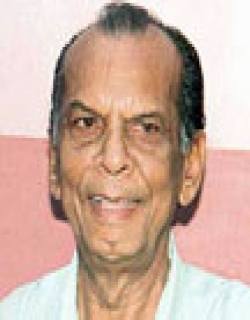
Johnny Walker
Abdul Sattar

Kum Kum
Juhi

Mehmood
Vijay's Brother
Reviews for Pyaasa
No Critic Review info for this movie yet.
No User Reviews for this movie yet. Be the first one to review!
Pyaasa Movie Wiki
This page provides latest and updated information about Pyaasa (1957) movie which released on 1957. Pyaasa (1957) is directed by , produced by , starring .We have also provided 2 trailers and videos, 8 photos, 28 user reviews, and 0 critic reviews.Pyaasa (1957) has received 3.9 rating from user reviews.The overall rating of Pyaasa (1957) is 78 and movie is 3.9.You can review, like, dislike this movie and also can add to favorites. You can also find information on showtimes, CDs, DVDs, online rental, online free watching.
